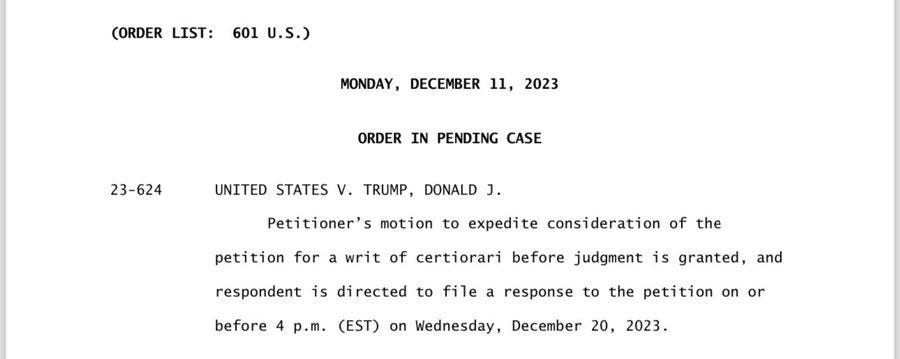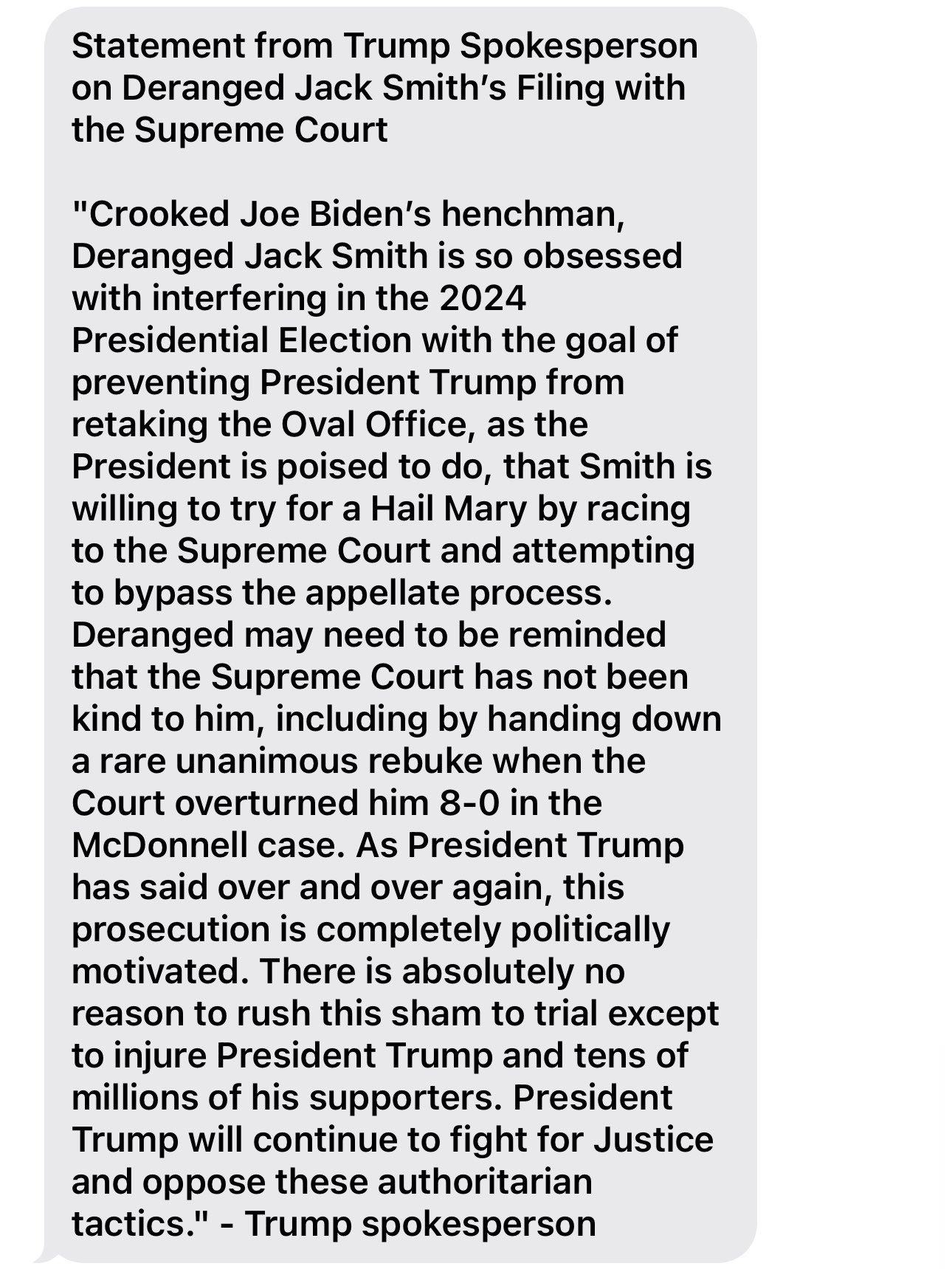Jack Smith's Bold Move
Today, Jack Smith asked the Supreme Court to decide whether a former president is “absolutely immune from federal prosecution” using a procedural device called a writ of certiorari before judgment. Smith wants to skip past the Court of Appeals and go straight to the Supreme Court to get a final decision on the immunity issue. A quick decision is essential if he’s going to stay on track for the March 4 trial date before Judge Chutkan. It’s a bold and logical move, the best path forward.
The full brief is here.
The issue comes down to this: Is Trump immune from criminal prosecution for the rest of his life for any acts he committed while president? In other words, is he above the law? Or can he be, as Jack Smith argues, prosecuted once he leaves the White House.
The Supreme Court has never decided this issue before. And it has to be decided, because if it goes in Trump’s favor, the case is dismissed and there will be no trial. I don’t think anyone expects that will be the outcome here, although you never know with the Supreme Court. But Smith is asking them to tell Trump that immunity (and double jeopardy, an argument with even less merit than immunity) is off the table so the case can proceed to trial.
Smith tells the Court that the case “presents a fundamental question at the heart of our democracy” and asks them to concur with the District Judge Chutkan, who held that “former presidents are not above the law and are accountable for their violations of federal criminal law while in office.” Smith’s point is that because ultimately this question of “imperative public importance” will come to the Supreme Court for a decision, and time is of the essence, there’s no point in taking the time involved in letting the Court of Appeals reach its decision first. It’s the antithesis of Trumps “delay, delay, delay” strategy. Jack Smith wants to cut straight to the chase.
SCOTUS quickly granted Smith’s request to expedite consideration of whether to hear the case. In other words, they’ve fast tracked the question of whether they should take the case or let it stay with the Court of Appeals. Appellate procedure can be arcane and alarmingly intricate in ways like this.
Trump has until December 20 to respond. Jack Smith also asked the Court to decide whether they will take up the case immediately following. Just to hedge his bets, he advised them that he will simultaneously ask the Court of Appeals to expedite their consideration of the case if the Supreme Court declines to hear it.
Jack Smith wants to expedite the whole process by skipping the Court of Appeals and going straight to SCOTUS, where this is likely to end up anyhow. As Trump tries to delay, delay, delay, Smith is pushing for speed. The standard the Supreme Court is supposed to use for deciding to hear the case on a writ of certiorari to review a case before the Court of Appeals decides it is whether “the case is of such imperative public importance as to justify deviation from normal appellate practice and to require immediate determination in this Court.” This case seems to fit the bill. In its brief, the Special Counsel’s office says that it “involves a paradigmatic issue of imperative public importance: the amendability to criminal prosecution of a former President of the United States for conduct undertaken during his presidency.” Smith says the question is “at the apex of public importance.” We’ll hear Trump’s thoughts on that soon enough.
It used to be rare for the Court to employ the writ to hear cases. In June 1998 for instance, Independent Counsel Ken Starr tried to use it twice for discovery disputes that broke out during the Whitewater investigation. The Court declined to take the matters up, expressing confidence lower courts could move quickly. But in recent years, the Court has taken up a number of cases before they were decided by a court of appeals, including cases involving abortion, affirmative action, DACA, and others. Smith has a reasonable chance of convincing the Court to hear the matter. “A writ of certiorari before judgement is appropriate when ‘the case is of such imperative public importance as to justify deviation from normal appellate practice and to require immediate determination in this Court,” he argues in his brief.
If Smith is successful, it ensures that the matter will be decided by the end of this term of Court at the latest—late June or the first week of July. If the case stays with the Court of Appeals for the District of Columbia, it’s possible that the Supreme Court wouldn’t get it until the next term of court, the one that starts in October of 2024, and the trial of this most important of cases would have no chance of happening before the election. If the Court grants Smith’s request to skip proceedings in the Court of Appeals, we’re assured of a decision by summer, and likely earlier. So this procedural move puts Smith in the best position he could be in.
“The United States recognizes that this is an extraordinary request,” writes Smith. “This is an extraordinary case.”
This is the kind of strategic move that suggests Smith is getting crackerjack appellate advice. The front cover of his brief confirms it. He has brought former Deputy Solicitor General Michael Dreeben on board as counsel of record. That means Dreeben will be handling the case before the Court.
You may recall Dreeben’s name. He was the chief appellate advisor for the Mueller investigation. He left the Solicitor General’s office for private practice after that. But he is not a political guy. His north star has always been the rule of law and his commitment to the Constitution. Dreeben was in the Solicitor General’s office for over 30 years. For 24 of them, he was the Deputy Solicitor General over the criminal side of the office. He’s argued more 100 cases before the Court and briefed many more. The Court has enormous respect for him.
I’ve interviewed Dreeben twice in the past year for Preet Bharara’s and my cafe.com Insider podcast. We’ve removed the paywall so you can listen to the interviews for free if you want to get a better sense of who Dreeben is. Listen to them here and here.
Trump weighed in with a predictable statement now that the Court of Appeals has limited the gag order on him and ruled that he can criticize Jack Smith and Joe Biden all he wants to:
(The reference to “McDonnell” is to a case where Virginia’s former governor Bob McDonnell was convicted of taking bribes by the Public Integrity Section at DOJ, which Jack Smith headed. The appeal to the Supreme Court was handled by the Solicitor General, not Smith. DOJ lost the case when the Court unexpectedly ruled that a governor setting up meetings for business people wasn’t an “official action” that could be prosecuted in exchange for accepting lavish personal gifts.)
This kind of childish statement isn’t funny. It’s part of Trump’s ongoing statement about who he is and who he thinks his voters are. If it’s a sham trial, why wouldn’t he want to rush it to expose the truth in advance of the election? That’s a good question to pose to Trump supporters.
With a December 20 deadline, is the Supreme Court preparing to play Santa or Grinch?
We’re in this together,
Joyce
Please consider signing up for a paid subscription to Civil Discourse. Your support ensures I’ve got the time and resources to give the important issues we face the consideration they deserve.





Someday there will be a Hollywood movie, and the script should be based on Civil Discourse. We live in interesting times. There are truly remarkable people out there fighting for democracy and you Joyce are one of them.
It never ceases to amaze me how tfg's brazen, rude, and frivolous behavior rubs off on his 'unnamed spokespersons'. With utter shamelessness he or she has the nerve to call tfg 'president'. NO, he is NOT president! He was a colossal insult to the American people as # 45, never behaved in a presidential manner for even one day, and we must thwart his attempts to become # 47.